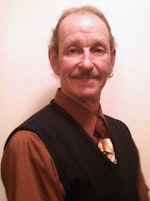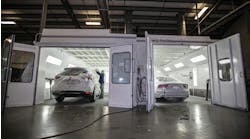Collision repair shop owners who belong to "20 Groups” are reporting that the numbers add up to greatly benefit their business operations. They also cite the personal growth that comes with membership.
A 20 Group, as the name implies, is a gathering of 20 or fewer business owners or managers who meet up to four times a year to share—and learn—the intricacies behind effective body shop operations. Usually regional or national in nature, 20 Groups stress confidentiality (“what’s said in this room stays in this room”), motivated participation and a strong desire to be among the best of the best. Dues vary widely. Depending on an individual 20 Group’s setup, annual fees can easily exceed several thousand dollars, or the service can be offered free when underwritten by a corporate sponsor.
The organization behind the group—which can be an independent professional facilitator or a sponsoring industry supplier, as with paint manufacturers—ensures that members within a given market are not in direct competition with each other.
Each 20 Group is unique, governed according to the decisions of the membership with guidance from the facilitator or sponsor. Ideally, your fellow members will have “like-minded businesses” similar in scope to yours but in a different market.
The concept actually is not limited to the collision repair field. Other industries, such as roofing contractors, facilitate similar programs. But as with these other trades, in collision repair the emphasis is on bettering both your business and yourself. Group leadership duties are shared on a rotating basis, and each member is expected to get with the program and follow-through on the various assignments. If you belong to a good 20 Group, you will consistently be challenged to improve your company’s performance.
“Most, if not all, of the better operators belong to a 20 Group,” contends Darrell Amberson, the Automotive Service Association (ASA) collision division director. “It helps us set a standard, and you’ll learn that other shops are having the same problems you are.”
President of Lehman’s Garage in Bloomington, Minn., Amberson belongs to a 20 Group sponsored by DuPont. “We get something out of every meeting we go to,” he says, citing, for example, the member-business shop tour included with each gathering. “It gives you an opportunity to see how the shop operates, and it gives the owner extra eyes looking at the business.
“Manytimes you’ll learn more from the other members than the instructors.” He recalls obtaining a single cost reduction idea related to his paint operation that saved his business enough money to cover the cost of several 20 Group meetings. “That paint idea did not come from the paint manufacturer. It came from looking at the [financial] numbers with the rest of the group,” he recalls.
Steve Louden, a former ASA chairman who about 20 years ago helped usher in the 20-Group concept to the collision and mechanical repair industry, considers these meetings to be self-help groups.
Louden spends $10,000 to $12,000 a year (including airfare and hotels) to participate in his group. It is worth every dime, he says, pointing to the member-shop visits as just a single example. “How much would you pay to have three industry experts review your shop?”
“The whole thing is a win-win situation,” says Louden. “The real benefit of a 20 Group is that you have non-competing body shops coming together to share their experiences.”
The conversations can be frank. “You’d better be wearing cast-iron underwear when you get in there,” he quips. “It pushes you along and prods you to improve; you get the group pressure. The accountability is the key, and we can get pretty pointed. At each meeting we commit to changing an aspect of our business.”
If you have a reluctance to adjust a targeted practice, you can take comfort in having the support, or prodding, of the group’s mindset: “Nineteen other members are doing this and it works great,” Louden muses, recalling how he resisted a particular change—only to conclude later that, “I should have done this 10 years ago.”
In any given group, chances are someone has already been there and done that. “Most of the solutions to our issues are right there at the table,” he says. “It’s a commitment. It’s sharing your ideas, successes and failures intimately with people you respect in the industry.” You are pressed to contribute. If called upon to address the group at the next meeting, “This is not something you put on a napkin the night before you’re going to present it.”
Running a business
“It’s critical for shops to learn from one another,” according to Elainna Sachire, president of Square One Systems, Inc. of Cortland, Ohio. The company facilitates four independent Coyote Vision Groups, along with four others sponsored by Sherwin-Williams. “Let’s find ways to become better, faster and cheaper,” she says.
Improvement is the primary mission. “If you’re in a 20 Group you want to get better—it’s not a complaint session,” says Sachire. “For example, if we have insurer speakers come in [to address a group], they know that this is not an insurance-bashing session; we have to do business with them.”
As president of Louden Motorcar Services, Inc. in Dallas, Louden belongs to a mechanical repair-oriented 20 Group administered by NCM Associates of Overland Park, Kan., a professional 20 Group facilitator that also produces 20 Groups for the collision repair industry. In Louden’s group, about 1 percent of the time is spent on the details of tackling repair techniques; 99 percent of the effort is directed toward monitoring cash flow and other business strategies.
“It forces you to better-manage your business, without a doubt, and you’d better be management-oriented today to run a successful shop,” he points out. “A lot of shop owners are technicians [having moved up to the top slot] who don’t have experience at running a business.”
A primary benefit of being in a 20 Group can be the monthly analysis of each member’s monthly financial figures—spotting trends and introducing benchmarks for potential achievement.
Complying with the software requirements of such systems presents a commonality for measuring a business’ performance while assisting owners in accurately recording the funds going in and coming out of the cash drawer.
“It forces me to look at my financial inputs once a month,” says Louden. “If you have your fingers on the numbers you know exactly what happened.”
The dollar amounts will vary, obviously, with rates in an area such as San Francisco differing drastically from a shop in the Midwest or New England. “Usually, when you get 20 shop owners together you get 20 different accounting systems,” Louden remarks, yet in your group “everyone is doing it [accounting] the same way—an expense account is done the same—and it all boils down to percentages.”
“We have an automated benchmarking system,” explains Mike Sillay, North American services manager for Akzo Nobel. “We’ve got in-depth market support tools that the collision centers can take advantage of. They can look at over 60 key performance indicators, and they can identify areas where they are weak and seek solutions.”
Twenty-eight 20 Groups are produced by Akzo Nobel’s in-house staff; there are 22 regional chapters, six national groups and one specializing in heavy trucks.
“We’ve got over 600 shops participating in these activities,” Sillay says. “It’s been steadily growing – we’re close to adding another group.”
Gamut of topics
At BASF, Stanton R. Thornbury describes how key performance indicators are made available to the membership of its four 20 Groups; the three American groups (the fourth is Canadian) are organized based on sales volume and number of member locales.
“The monthly reports of KPIs, benchmarks and shop goals are standard throughout the groups,” says Thornbury, the company’s VisionPLUS program manager.
A “nominal” membership fee is charged by BASF for participation. “For the most part, BASF is funding the 20 Group experience for our customers.” The sessions are produced by the Chelsea Group, Inc. of Vista, Calif., a professional facilitation firm.
“A whole gamut of topics have made our agendas,” Thornbury points out, “from Theory of Constraints to Maintaining and Growing Your Workforce, our agendas are always packed. The Chelsea Group has been quite successful at putting together agendas that bring great value to the meetings. The guest speakers brought in have been phenomenal,” he reports, although details are held close to the vest. “As our events are totally confidential in nature, I am not at liberty to divulge this information.”
Nonetheless, “It’s always a great feeling as to how many of these owner/operators walk away from the table with a new idea that they can implement in their shop. Most every meeting, our members are going to take something back with them that can improve their business,” according to Thornbury.
“The specific qualifications vary by group,” he says. “However, pertaining to all the groups, we are looking for the winners or ‘winners in waiting.’ They must be able to bring value to the table with their knowledge and insights into their own operations,” he adds.
“There is a multi-level approval process that a shop must go through to get approved to join one of our groups,” says Thornbury. “Ultimately the final vote is up to the members of the group after an initial invite to an event.”
Chelsea’s Dale Delmege notes that a shop owner belonging to a 20 Group “learns the best practices of a dozen or more other successful owners: How to buy better, sell better, repair better and faster, operate a small business better and, eventually, how to maximize his wealth and move on when it’s time to do so.”
Meeting topics have included the following: DRP Strategies: Maximizing the Mix; Compensating and Motivating the Location Manager; Estimate Accuracy: Blueprinting the Job; Marketing to the Local Vehicle Owners; Quality Control and CSI; Cycle Time Dynamics; and Dealing with Dealer Business.
Chelsea currently facilitates six 20 Groups, expecting to add two more this year; there is a waiting list for a new self-sponsored group of large, single-location operators.
“Interest has grown faster than consistent supply,” says Delmege. It takes more than 100 hours of preparation for a professional facilitator to competently manage what he refers to as “the exchange of jealously guarded trade secrets among a roomful of self-made entrepreneurs.”
The 12 20 Groups hosted by PPG contain the top 10 percent of the nation’s top performing body shops, according to Paul Ong, marketing manager of refinish alliance programs. “We make sure we get the top players in there. We don’t even call them 20 Groups; we call them our MVP Roundtables.”
PPG’s investment in these offerings is worth it, observes Ong, noting how a successful body shop buys more paint and glass products. “If their business does well, ours does well,” he says.
Customer loyalty is among the goals pursued by the three national 20 Groups produced by DuPont in the United States (there are nine Canadian 20 Groups), reports Greg Farden, DuPont Performance Coatings Loyalty Program manager. “We get to learn from our customers—we learn what their needs are,” he points out.
“This is not a commercial for DuPont,” says Fardin, stressing the depth of material covered in the meetings. “We allow our customers to tell us what the agenda will be. They’ll give us a subject and we’ll go out and find a speaker. Our customers become stronger in the long run, and I would hope we’d see increased customer loyalty.” It seems to be working, as the company plans to add at least one new group, possibly two, this year.
CARSTAR is a franchise-business operation, and membership in one of the chain’s four 20 Groups is included in the contract. These meetings assist in “cementing the systems” that the company applies to its operational strategies, according to Margaret Ray, assistant vice president of integration and financial services.
“We’re all bound together by a number of different things, and there’s a huge commonality among our stores,” says Ray, yet seeing how a given CARSTAR site operates in a different area of the country is often enlightening, as in: “Can I make this work in my store?”
Individual growth
Not to be overlooked is the aspect of individual growth that one gains via 20 Group membership. “It becomes an extended family,” Louden notes. “We deal with personal problems, too—we’ve had divorces and illnesses over the years,” and the camaraderie has helped them cope with these life-altering challenges.
“It gets real personal and real involved,” he adds. “That’s why the confidentiality of the group is extremely important.”
Along these same lines, critical elements of any 20 Group’s membership roster include the concept of “cultural fit” and the proximity of the participants relative to each shop’s marketing territory. “It takes a lot to share your financial statements with somebody,” says Louden. “You can’t do that when the 20 Group is in your metro area because you’re competing with each other for customers and employees.”
A 20 Group’s membership policies can vary in their stringency. The bylaws for Louden’s group specify that a potential recruit must pass each member’s muster. “You have to like the people,” he explains. “We check these people out real close, and if one person doesn’t want a person in there, he doesn’t get in.”
A business’ size and goals are other considerations; “like-minded” shops are best-suited for a given group’s roster. A $5 million operation will have differing needs than a $500,000 company.
And while 20 Groups have proliferated over the past two decades, the collision repair industry remains under represented. “It’s like going to church—the people who need to go the most don’t come,” opines Louden, referring to some proprietors who feel owned by their shops with no time to spare.
Such thinking can be short-sighted, and Louden advises every shop owner to consider joining a 20 Group after first investigating the offerings to determine a good fit. “There are 20 Groups, and then there are 20 Groups,” he comments. “A true 20 group is self-motivated and self-managed,” with logistical assistance from a professional facilitator.
A reputable regional or national group is better than a strictly local operation lacking professional expertise and a solid foundation. “I’ve seen a lot of the smaller groups fall apart,” Louden asserts.
“The paint companies have really stepped forward” to assist the collision industry—and themselves—by offering an array of 20 Group selections. “All of the suppliers are interested in the success of their customers,” Louden explains.
Dues or no dues, each 20 Group member is responsible for their own travel and lodging expenses, which can be controlled, in part, via the group’s site-selection process. “If you’re meeting in Omaha, Neb., it’s a lot different than the hotel in Lake Coeur D’Alene, Idaho. When we go to nice locations, 75 percent of the spouses come” and enjoy vacation-type activities.
Most, if not all, of the industry 20 Groups organize shop tours among the membership. “You’ve got guys who’ve been in business 20 years, and they’re going to share a lot with you” when they see your shop up close and personal, says Louden. “They already know your numbers—so now they’re seeing behind your numbers.”
The members of Louden’s 20 Group have elected to set up a three-person Review Committee to conduct shop tours rather than gathering everyone together for a walk-about. “We quit doing that; you can’t have 19 guys coming through your shop because they can’t see everything. Our Review Committee spends two days in the business—we blend in to the woodwork and write a report” analyzing the shop’s positives and negatives while providing possible solutions, he notes.
With the numbers-crunching and onsite inspections, previously unnoticed details about a facility often become obvious, according to a 20 Group industry insider granted anonymity: A shop owner was pondering the possibility of opening a second location. “You need to make sure the existing shop is operating correctly,” he was told. “Maybe you should open on Saturdays [rather than expanding],” was another bit of advice. A post-tour analysis was a little more succinct: “Maybe you should open another bay or two—either move your boat or get daddy’s airplane out of there!”
Major Collision Industry 20 Group Contacts
Coyote Vision Group
Square One Systems, Inc.
PO Box 726
Cortland, Ohio 44410
(330) 637-5265
www.square1sys.com
No. of groups: 4 (independent); 4 (Sherwin Williams)
Dues: varies
The Chelsea Group, Inc.
110 Escondido Ave. #103
Vista, Calif. 92084
(760) 295-4099
Internet site currently under renovation
No. of groups: 2 (independent); 4 (BASF)
Dues: varies
NCM Associates
10551 Barkley, Suite 200
Overland Park, Kan. 66212
(913) 649-7830
www.ncm20.net
No. of groups: 2 (for body shops)
Dues: $230 a month
Akzo Nobel
5555 Spalding Dr.
Norcross, Ga. 30092
(770) 662-8464
www.sikkens.net
No. of groups: 22 (regional); 6 (national)
Dues: $1,700 (regional); $2,500 (national)
DuPont Performance Coatings
47802 W. Anchor Ct.
Plymouth, Mich. 48170
(734) 354-3440
www.usa.dupont.com
No. of groups: 3
Dues: $2,150 annually
PPG
19699 Progress Dr.
Strongsville, Ohio 44149
(440) 572-6199
www.ppg.com
No. of groups: 12
Dues: none




